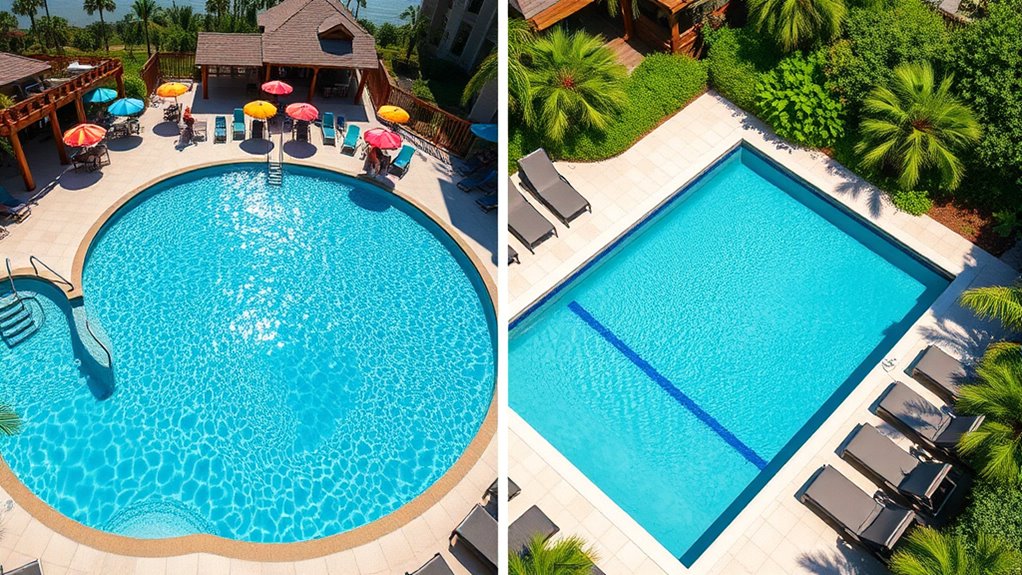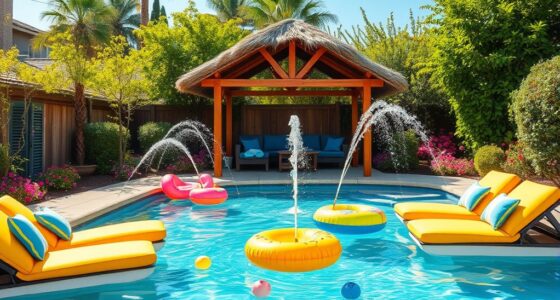Choosing between a community pool and building your own private one depends on your budget, privacy needs, and lifestyle. Community pools are more affordable initially and great for socializing, but you share the space with others and have less control. Private pools offer privacy and customization but come with higher upfront costs and maintenance responsibilities. Consider what matters most—cost, solitude, or socializing—and explore the details to make the best choice for you.
Key Takeaways
- Community pools are more affordable upfront but involve shared access and less privacy.
- Private pools offer customization and privacy but require a significant initial investment and ongoing maintenance.
- Consider whether social interaction or solitude aligns better with your lifestyle to choose the suitable option.
- Maintenance costs are included in community fees, while private pools require self-management or hired services.
- Your decision should balance budget, privacy preferences, and how much control you want over pool features and upkeep.

When deciding between a community pool and a private one, your choice depends on your lifestyle, budget, and priorities. If you’re weighing these options, it’s essential to consider how maintenance costs and privacy concerns will impact your experience. Community pools are typically more affordable upfront, but you should factor in the ongoing maintenance expenses that come with them. These costs cover cleaning, chemicals, repairs, and staffing, which are usually included in your membership fee or pool pass. Over time, these expenses can add up, especially if the pool requires frequent repairs or upgrades. On the other hand, a private pool involves a significant initial investment, but maintenance costs can be more predictable and tailored to your standards. You control how often it gets cleaned, which chemicals are used, and when repairs are needed, potentially reducing unnecessary expenses or delays. Additionally, a private pool can often be equipped with low-light-friendly plants or features that enhance privacy and ambiance. Privacy is another vital aspect to consider. A private pool offers a level of seclusion that community pools simply can’t match. When you build your own, you can design it exactly to your preferences, ensuring that your family’s swimming time stays private. If privacy concerns influence your decision, a private pool provides peace of mind, especially if you value undisturbed relaxation or have children who need a secure environment. Community pools, by contrast, are shared spaces. While they can be convenient and social, they often come with the drawback of crowds and less control over who’s around. If you prefer quiet, solitude, or worry about safety or cleanliness, a private pool might be the better choice. Your lifestyle also plays a role here. If you enjoy socializing and meeting neighbors, a community pool can be a fantastic way to foster connections without the hassles of maintenance. These pools often come with amenities like lounge chairs, lifeguards, and community events, making them a convenient option for families or social butterflies. Conversely, if you want a space solely for your family’s use, a private pool offers flexibility—no need to adhere to community rules or schedules, and you can personalize it with features like waterfalls, lighting, or heating systems. Ultimately, weighing maintenance costs against your privacy concerns will help you determine what suits your needs best. Community pools are cost-effective and social but less private, while private pools demand a higher investment upfront but offer exclusivity and control. Think about how much time, effort, and money you’re willing to devote to upkeep, and whether privacy is non-negotiable for you. Your decision should align with your financial situation, lifestyle preferences, and how much you value solitude versus social interaction.
Frequently Asked Questions
What Are the Typical Costs Associated With Building a Private Pool?
When considering building a private pool, you’ll want to know the typical costs involved. Construction costs usually range from $20,000 to $50,000, depending on size and features, while material expenses can add another $10,000 to $20,000. Keep in mind, additional costs like permits, landscaping, and pool accessories can increase your total investment. Planning ahead helps you budget effectively and avoid surprises during the project.
How Do Maintenance Responsibilities Differ Between Community and Private Pools?
Imagine a serene oasis—your paradise. When it comes to maintenance, you’re the captain of your private pool’s ship. You handle pool cleaning and chemical balancing, ensuring clear, safe water. In contrast, community pools require coordinated upkeep by staff or management, easing your burden but limiting control. With a private pool, every sparkle depends on your effort; with a community pool, it’s shared responsibility. Which peace of mind do you prefer?
Are There Legal Restrictions or Permits Needed for Private Pool Construction?
When you consider building a private pool, you need to be aware of legal restrictions and permit requirements. Local regulations often mandate permits to ensure safety and compliance with zoning laws. You should check with your city or county authorities before starting construction. Failing to obtain necessary permits can lead to fines, delays, or even having to remove your pool. Always verify permit requirements early to avoid legal issues down the line.
What Safety Features Are Recommended for Private Residential Pools?
You might find yourself considering safety features for your private pool, especially when you realize how many options exist. To keep everyone safe, install secure fencing that complies with local fencing regulations, and consider pool cover options like automatic or mesh covers that prevent accidental falls. These features create a safer environment, giving you peace of mind while enjoying your backyard oasis without worry.
How Does Pool Size and Design Impact Long-Term Costs?
When considering pool size and design, you directly influence your long-term costs. A larger pool or complex design increases expenses for maintenance, chemicals, and energy use. You might save money upfront with a simple design, but it could cost more over time due to higher upkeep. Smaller, streamlined pools are more cost-effective long-term, so choose a size and design that balance your enjoyment with budget considerations.
Conclusion
Ultimately, choosing between a community and private pool comes down to your lifestyle. A community pool offers affordability and social opportunities, yet lacks privacy. On the other hand, a private pool provides intimacy and control, but at a higher cost. It’s like sharing a sunny day with neighbors versus enjoying it alone—both have their perks and pitfalls. Decide which experience suits your needs and budget best, and make a splash that truly feels right for you.









